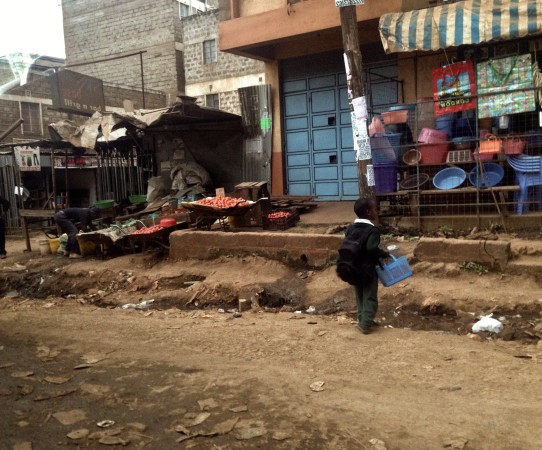Juliette Wairimu Kariuki is about to enter her second year of PhD studies at CAS. Her thesis examines informal food provisioning systems in Nairobi, Kenya. In this post she reflects on her preliminary fieldwork in Nairobi and the unexpected ‘learning moments’ it presented.

Juliette conducting research
Conducting preliminary field research was an exploratory research journey. I arrived in Kenya with no strict agenda or preconceived ideas. I went to learn and observe what is happening – what people are saying and doing about my topic of interest, urban food provisioning. By doing this I stumbled upon realities that I hadn’t previously considered.
Informed by my Research in Africa module here at Edinburgh as well as the experience I gained as a research practitioner during my MSc degree at UCL (pictured above in MeK’ele Tigray Ethiopia), going to the field was different this time. I felt more prepared and aware of the advantages of doing fieldwork as well as the complications that one may expect to face in the field.
With this little bit of experience, I tried to be aware of my position and the dangers of having a ‘researcher as knower’ perspective. To aid me in this process, I made sure to pack a field journal to use as part of my journey, taking the time to record observations whilst on the matatu (public bus) or in the evenings after Chai (tea).
In my journal, I recorded notes based on any interactions and observations I had in the day (no-matter how small or seemingly unimportant). On the basis of these daily notes I could reflect and ask myself why did the conversations or observations go the way they did?
These accumulated moments of reflection enabled me to change what or who I was observing the following day, or even the location of my observations. Since returning from my preliminary research in Kenya, I have been asked by fellow researchers and acquaintances, “how was your preliminary fieldwork?” Each time, I find myself answering the question slightly differently, drawing on a different experience/note from my journal. Each answer I give highlights the many experiences one encounters in the field, from the creation of new research relationships, to the opportunity to explore new research narratives and questions.
At this moment, as I attempt to recollect the many experiences of my research, I find myself drawn two particular words, ‘learning moments’. Learning moments, are instances where you can make connections between the existing complex contexts. For me, these moments helped connect the theory to the local context.
These new connections were not necessarily in line with what I had read. In my case, these connections revealed my lack of knowledge regarding the constraints of my location, scope, and my research design. These moments of awareness, or reflection also pointed towards the lack of available data, underscoring the necessity of preliminary fieldwork to uncover these gaps in data. My reflections and learned knowledge were only possible through my improved understanding of the context of my research. In short, these learning moments involve the connections between what you think you know and the reality of what you don’t know.
To give a concrete example of a learning moments – when I first began my preliminary fieldwork, I made sure to keep my mind open to every interaction. I paid particular attention to the natural moments of exchange that happened surrounding food. These exchanges occurred regularly throughout the day; they ranged from the conversations we had between the owners and clients of the corner juice stall, visitors to an open-air-carwash, vendors at the night markets, to the conversations with the lady making lunch for contractors building a four story apartment block.
What became clear in these learning moments is that the culture of food was much more than what I had read. I discovered different types of food served different purposes in different areas. It was only through reflection (going back to my diary notes) that my fieldwork began to take shape. I hadn’t realised the variation of available foods sold along specific streets, that both raw and cooked foods are sold by these vendors, some specialising in meat and others in both vegetables and fresh meat. I saw the extent to which each vendor used their unique relationships with their clients. I also began to take note of the role of the informal food system, the dynamics of rural assemblers and purchasing agents, and rural-urban wholesalers and brokers.
These learning moments were important because they added a deeper narrative to my research, a narrative I couldn’t have found in the literature. Instead, paying attention to the learning moments assisted me in reaching a more localised understanding of the lived experiences of inhabitants of Nairobi.
These learning moments prevented me from looking at the research field as a site of a problem that need fixing. Rather, the field became a learning experience, allowing me the space to discover new connections between certain themes I had once dismissed as well as to question my own positionality and assumptions. Although frustrating at times, being open to change, allowing your ideas and topic to be challenged and evolve is essential.
Preliminary fieldwork is definitely a step in the right direction if you would like to engage in research that will truly contribute to poverty reduction development agendas that are reflective of the community and are practical and sustainable.

Githurai Estate, Nairobi, Kenya. A popular street market for food and other goods.